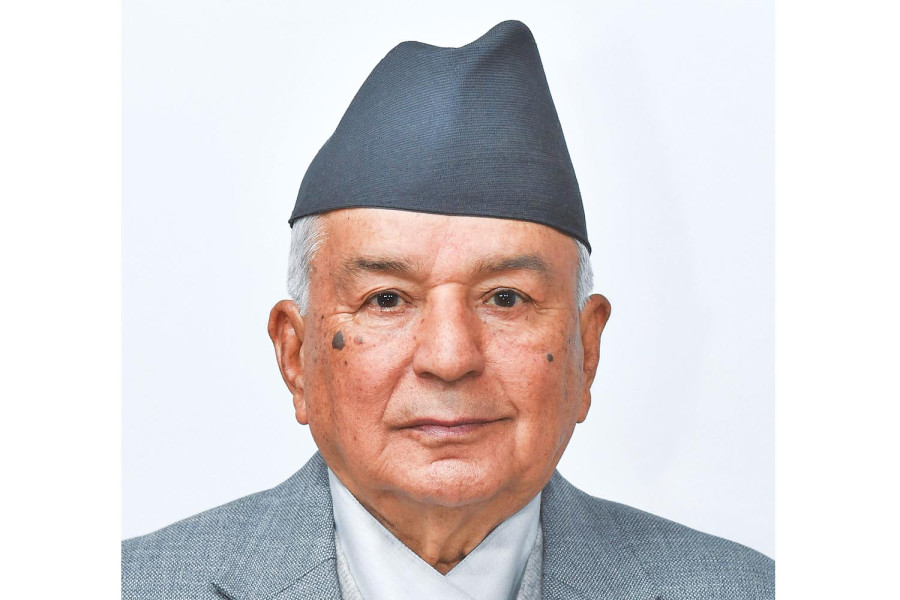National
President under close watch after mild heart attack
A member of his personal staff says the head of state has been unable to rest as advised by his physicians.
Anil Giri
President Ramchandra Paudel, 78, has not been keeping well since he assumed office on March 13 and there are many speculations about his health.
Less than a month after assuming office, on April 1, Paudel was admitted to the Tribhuvan University Teaching Hospital at Maharajgunj, Kathmandu after complaining of a problem in his abdomen. The next day, the hospital discharged him after some treatment. But his illness did not end. After experiencing shortness of breath and fatigue, he was again admitted to the Teaching Hospital on April 18. Doctors attending on Paudel said that his oxygen levels had dipped.
After his first bout of illness, the government had deployed a team of officials, led by the health secretary, to facilitate his treatment. The team was told to assess the President’s illness and report to the government on how he could receive the best treatment. Then he became seriously ill and had to be taken to India.
The President has comorbidities, doctors say, including problems in his lungs, heart and stomach. Some had suggested taking him to Bangkok for treatment. But the government decided that he be flown to New Delhi to treat his multiple ailments at the All India Institute of Medical Sciences (AIIMS).
On April 19, Paudel was flown to India and admitted to AIIMS. Upon his return from New Delhi on April 30, the Office of the President said that Paudel had gone through various check-ups and treatments at the AIIMS and doctors attending on him had advised him to take rest for a few more weeks. The decision to pay for the treatment from the treasury courted controversy. Later, Paudel’s personal secretariat said that the President had expressed his desire to himself pay for the expenses incurred in his treatment in New Delhi.
The President’s treatment at AIIMS was inexpensive, a government official said. The cost of the chartered flight, and the expenses of his family members’ stay in New Delhi added to the bills, the official added.
“After his return from India, the President’s health had improved significantly. But he soon had his hands full with stressful assignments and he could not rest properly,” said an official at the President's Office.
On June 13, Paudel complained of chest pain and was admitted to Shahid Gangalal National Heart Centre. “After sensing some problem in his heart, doctors at Shahid Gangalal carried out an angioplasty on the President and inserted a stent in his heart,” said Suresh Chalise, chief personal assistant to Paudel.
“The President had a mild heart attack or a non-ST elevation myocardial infarction [NSTEMI],” said another official familiar with his treatment. “When there is only a partial blockage in the artery, the symptoms don't last as long as a regular heart attack, and the heart may only suffer minimal damage.”
He added: “The clinical term is myocardial infarction and it happened on the right side of Paudel’s heart. The President stayed for a full day at the hospital and was then discharged. But he again felt uneasy on Friday night and was admitted to Manmohan Cardiothoracic Vascular and Transplant Centre of the TU Teaching Hospital.”
Doctors at the hospital are monitoring the President’s heart, said Kiran Pokhrel, press coordinator to the President.
A statement issued by the hospital said President Paudel’s health is now stable.
“After his discharge from Gangalal Hospital, the President should have taken full rest but he could not,” a presidential staff member said.
The President administered the oath to Chief Justice Hari Krishna Karki on Friday. Earlier in the day, he had received the credentials of some ambassadors posted to Kathmandu.
“President Paudel does not seem to be following the strict protocol that doctors have advised him,” the official said, trying to explain why the President has been having frequent health issues of late.
Doctors at the Manmohan Cardiothoracic Vascular and Transplant Centre said that only after placing him under observation for a full 24 hours would a decision be taken on whether he should be discharged on Sunday.




 8.43°C Kathmandu
8.43°C Kathmandu














